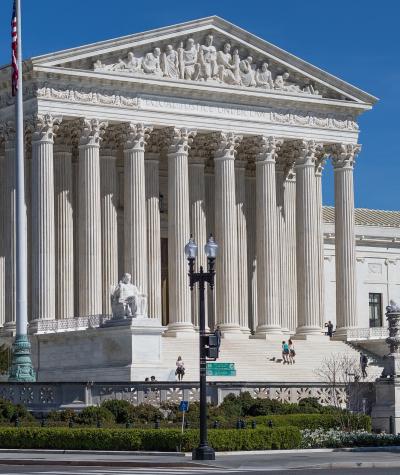Unrestricted corporate speech in elections without disclosure of those funding the speech is contrary to the Court’s theory in Citizens United v. FEC, which paired corporate First Amendment speech rights with the virtues of disclosure of the sources of such speech—disclosure to shareholders and to the general public.
Justice Kennedy’s 8-1 majority opinion, spanning the philosophical wings of the Court, said on this point:
'The First Amendment protects political speech; and disclosure permits citizens and shareholders to react to the speech of corporate entities in a proper way. This transparency enables the electorate to make informed decisions and give proper weight to different speakers and messages.'
Unfortunately nobody informed the voters who was footing the bill for the tens of millions of dollars in television advertising foisted on them by groups with patriotic sounding names.
Justice Kennedy’s majority opinion also made clear that it is generally constitutional to require disclosure of the sources of funding for spending in federal elections, whether or not that spending “expressly advocates” the election or defeat of a federal candidate. He stated that the Court rejected the notion that disclosure requirements should be limited to “express advocacy,” and noted that the Supreme Court had, in a variety of contexts, upheld disclosure requirements that covered constitutionally protected acts, such as lobbying. “For these reasons,” Justice Kennedy stated, “we reject Citizens United’s contention that the disclosure requirements must be limited to speech that is the functional equivalent of express advocacy.”
In addition, Justice Kennedy and seven other Justices were clear that they thought such disclosure was entirely appropriate and useful in a democracy. He stated that disclosure of the sources of funding of political advertising “provide[s] the electorate with information” and “insure[s] that the voters are fully informed about the person or group who is speaking.” He also cited the holding in Bellotti that “[i]dentification of the source of the advertising may be required as a means of disclosure, so that the people will be able to evaluate the arguments to which they are being subjected.”
As to the value of disclosure of political speech, Justice Kennedy was equally clear. He wrote:
"With the advent of the Internet, prompt disclosure of expenditures can provide shareholders and citizens with the information needed to hold corporations and elected officials accountable for their positions and supporters. Shareholders can determine whether their corporations political speech advances the corporation’s interest in making profits, and citizens can see whether elected officials are ‘in the pocket’ of so-called moneyed interests."
Thus, Justice Kennedy binds together the two elements of his Opinion – independent corporate speech in elections is now protected by the First Amendment, and the funding sources of such speech must be fully disclosed in order to make this constitutional right function in our political system. This section of Justice Kennedy’s Opinion was the only one joined by the four Citizens United dissenters, meaning that the fundamental importance of disclosure was recognized by eight of the nine Justices.
Opponents of disclosure raise concerns about threats and intimidation. They cite NAACP v. State of Alabama, which found in the late 1950s that NAACP members were being exposed to “economic reprisal, loss of employment, threat of physical coercion, and other manifestations of public hostility,” and that, as a result, the organization should not be compelled to make its membership rolls public. They also refer to a case from the 1980s involving the Socialist Workers Party, which exempted the Party from campaign finance disclosure requirements because they had shown a reasonably probability of threats, harassment, etc. of their members if they were to be disclosed. But the Socialist Workers case demonstrated that the Supreme Court already recognizes an exemption from disclosure when there is a very strong likelihood of violence or recrimination. Neither of these cases stands against the proposition that disclosure should indeed be the general rule. Therefore, opponents are raising an objection that has already been dealt with by the Court.
While there is indeed little I may agree upon with Justice Scalia when it comes to the area of campaign finance, he has made clear that disclosure, in his view, is essential. In the oral argument of Citizens United, he told the plaintiff’s lawyer, "You know, you can't run a democracy this way, with everybody being afraid of having his political positions known.”
Justice Scalia’s closing words in his concurrence in Doe v. Reed – decided after Citizens United – concerning the disclosure of names on a ballot-referendum petition, reinforce the need for Congress to act to complete the process begun by Citizens United.
In that case, he stated:
"There are laws against threats and intimidation; and harsh criticism, short of unlawful action, is a price our people have traditionally been willing to pay for self-governance. Requiring people to stand up in public for their political acts fosters civic courage, without which democracy is doomed. For my part, I do not look forward to a society which, thanks to the Supreme Court, campaigns anonymously (McIntyre) and even exercises the direct democracy of initiative and referendum hidden from public scrutiny and protected from the accountability of criticism. This does not resemble the Home of the Brave."
